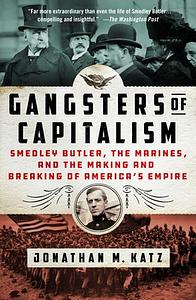Take a photo of a barcode or cover
118 reviews for:
Gangsters of Capitalism: Smedley Butler, the Marines, and the Making and Breaking of America's Empire
Jonathan M. Katz
118 reviews for:
Gangsters of Capitalism: Smedley Butler, the Marines, and the Making and Breaking of America's Empire
Jonathan M. Katz
This was a great approach to such a well-documented historical figure who has nevertheless fallen out of recognition, mixing his exploits with the author's journeys to each place in the modern day, and using the fascistic coup plots of the 30's that tried to rope him in as the narrative frame, closing with Reality Winner, January 6, and the Trumpist movement as examples of how much these times resemble those. Now I will go and read "War is a Racket," finally.
challenging
informative
reflective
medium-paced
Good, especially as a sequel to How to Hide an Empire by Daniel Immerwahr. The main flaw is that the narrative jumps around a lot mid-chapter from Smedley Butler to later events and it was hard to keep track of WHEN we were. But it was worth the listen anyway.
The narrator sounds a bit like Tom Hanks.
The narrator sounds a bit like Tom Hanks.
Smedley Butler — a name you may not know but whose actions integrally shaped America’s legacy at home and around the world. As a member of the Marine Corps, Butler partook in just about every American conflict, mission, and invasion beginning at the turn of the 20th century and prior to WWII. Most interesting, though, is how his time in service convinced him that war is a racket, a claim he would use to title a 1935 book in which he argues the majority of the United States’ foreign policy is to support and protect capitalistic interests at home. This belief is what convinced him to warn a Congressional committee about the Business Plot, a conspiracy to overthrow FDR designed by American business leaders, fascists, and the politicians who supported them…allegedly.
In Gangsters of Capitalism, Jonathan M. Katz traces Butler’s storied life not just from archives but by visiting the countries the Maverick Marine would (in)directly help exploit. Even though many Americans may know little to nothing about our early-20th century expansionism, the peoples harmed by it have not forgotten. To this day, Butler is known as mechan (evil) and the Devil in Haiti. This book isn’t a biography, per se, of an imperfect man conflicted by both pride and regret but more so a history of how America’s past imperialism might actually be prologue.
In Gangsters of Capitalism, Jonathan M. Katz traces Butler’s storied life not just from archives but by visiting the countries the Maverick Marine would (in)directly help exploit. Even though many Americans may know little to nothing about our early-20th century expansionism, the peoples harmed by it have not forgotten. To this day, Butler is known as mechan (evil) and the Devil in Haiti. This book isn’t a biography, per se, of an imperfect man conflicted by both pride and regret but more so a history of how America’s past imperialism might actually be prologue.
informative
medium-paced
Needs to be required reading in history, political science, economics, and probably many other classes. Katz explores the foundation of American imperialism from the 1800s through 1/6/21. Butler was fascinatingly complex, starting with his identity as "the fighting Quaker."
informative
medium-paced
This was one of the best books I've read all year. Katz traces the evolution of American imperialism throughout the late 1800s / early 1900s by focusing on General Smedley Butler's storied career in the Marines, which begins with the invasion of Cuba in the 1899 Spanish-American War. Katz follows Butler as he is sent into Cuba, the Phillipines, Nicaragua, Honduras, Panama, and China, using a rich blend of primary sources (letters that Butler and his family wrote one another, newspaper clippings, photographs, etc.). Katz also physically travels to these countries (especially the cities or locales which saw the brunt of the fighting) to offer the reader an understanding of the implications of American colonialism in these areas.
Butler is a fascinating figure -- a Quaker who joined the Marines, loved his men, was full of contempt for the peoples he subjugated, and who eventually grew so disillusioned by the influence of industrialists, bankers, and financiers on American foreign policy that he wrote War is a Racket. Here is an illustrative snippet:
"I helped make Mexico, especially Tampico, safe for American oil interests in 1914. I helped make Haiti and Cuba a decent place for the National City Bank boys to collect revenues in. I helped in the raping of half a dozen Central American republics for the benefits of Wall Street. The record of racketeering is long. I helped purify Nicaragua for the international banking house of Brown Brothers in 1909-1912. I brought light to the Dominican Republic for American sugar interests in 1916. In China I helped to see to it that Standard Oil went its way unmolested.
During those years, I had, as the boys in the back room would say, a swell racket. Looking back on it, I feel that I could have given Al Capone a few hints. The best he could do was to operate his racket in three districts. I operated on three continents."
I think Americans should read this book and understand the legacy of their empire, something that most people I talk to aren't aware of. Why are migrant 'caravans' from Honduras and Nicaragua pushing north? Why is Haiti, the first free Black republic, mired in poverty and corruption? Why is Panama such a stratified society, with a strong legacy of segregation between Euro-Panamanians and Carribean-Panamanians? The answer to all these questions lies in a particularly dark and violent chapter of American history.
Butler also warned of the dangers presented by European fascism, and was instrumental in preventing a similar putsch (funded by Wall Street bankers and other leading industrialists) from taking place in America ( see the Wall Street Putsch)
In the aftermath of the Trumpist putsch, Katz presents a quote by Franz Fanon, which sums up the current resurgence of fascist thought in America: "What is fascism if not colonialism when rooted in a traditionally colonialist country?" America's long engagement in military action and subjugation of peoples on its periphery has informed multiple domestic policies: the War on Drugs, the militarization of police, the designation of citizens as 'domestic terrorists' (which legally opens up a Pandora's Box of counterinsurgency operations against Americans).
Overall review: Fantastic book, full of anecdotes about the different players in the different countries presented, expositions on contemporary American foreign policy, and all weaved together by Katz into an engaging narrative.
Fairly long, finished in 10 days of intermittent reading.
Butler is a fascinating figure -- a Quaker who joined the Marines, loved his men, was full of contempt for the peoples he subjugated, and who eventually grew so disillusioned by the influence of industrialists, bankers, and financiers on American foreign policy that he wrote War is a Racket. Here is an illustrative snippet:
"I helped make Mexico, especially Tampico, safe for American oil interests in 1914. I helped make Haiti and Cuba a decent place for the National City Bank boys to collect revenues in. I helped in the raping of half a dozen Central American republics for the benefits of Wall Street. The record of racketeering is long. I helped purify Nicaragua for the international banking house of Brown Brothers in 1909-1912. I brought light to the Dominican Republic for American sugar interests in 1916. In China I helped to see to it that Standard Oil went its way unmolested.
During those years, I had, as the boys in the back room would say, a swell racket. Looking back on it, I feel that I could have given Al Capone a few hints. The best he could do was to operate his racket in three districts. I operated on three continents."
I think Americans should read this book and understand the legacy of their empire, something that most people I talk to aren't aware of. Why are migrant 'caravans' from Honduras and Nicaragua pushing north? Why is Haiti, the first free Black republic, mired in poverty and corruption? Why is Panama such a stratified society, with a strong legacy of segregation between Euro-Panamanians and Carribean-Panamanians? The answer to all these questions lies in a particularly dark and violent chapter of American history.
Butler also warned of the dangers presented by European fascism, and was instrumental in preventing a similar putsch (funded by Wall Street bankers and other leading industrialists) from taking place in America ( see the Wall Street Putsch)
In the aftermath of the Trumpist putsch, Katz presents a quote by Franz Fanon, which sums up the current resurgence of fascist thought in America: "What is fascism if not colonialism when rooted in a traditionally colonialist country?" America's long engagement in military action and subjugation of peoples on its periphery has informed multiple domestic policies: the War on Drugs, the militarization of police, the designation of citizens as 'domestic terrorists' (which legally opens up a Pandora's Box of counterinsurgency operations against Americans).
Overall review: Fantastic book, full of anecdotes about the different players in the different countries presented, expositions on contemporary American foreign policy, and all weaved together by Katz into an engaging narrative.
Fairly long, finished in 10 days of intermittent reading.
Really really good. Covers the life of a very important Marine. Really helps you understand how America forged an Empire from the Spanish American war to WW2 and how focused it was on expanding capitalism.
Heavily recommend
Heavily recommend





